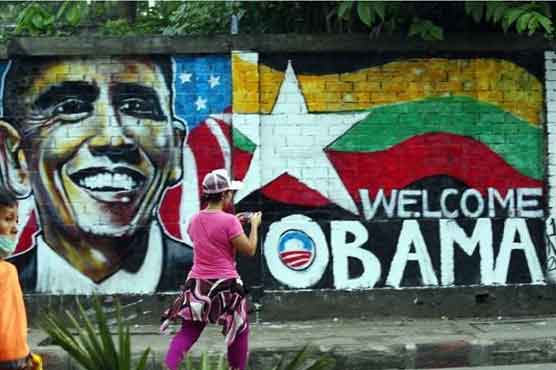Myanmar animated at historic Obama visit

US President will encourage Myanmar rulers to push political reform drive.
Obama touched down in Air Force One in Bangkok, sending a message that relationships like the six-decades-old treaty alliance with Thailand will form the bedrock of US diplomacy as the region warily eyes a rising China.
He will become the first sitting US president to visit formerly isolated Myanmar, on Monday, and will laud President Thein Sein for ending a dark era of junta rule, but also prod him to go much further towards genuine democracy.
With his image emblazoned on T-shirts, mugs and even graffiti-covered walls, Obama fever is sweeping Myanmar s biggest city ahead of a landmark visit to the long-time pariah state.
Residents on the streets of Yangon voiced hope that the historic arrival of Barack Obama on Monday -- the first by a serving American president -- would mark a watershed in their country s fragile reform process.
"I think his visit will help our path to democracy a lot and encourage the Myanmar government to continue the democratic process," said 28-year-old shopkeeper Thant Zaw Oo.
"I would like to tell President Obama to push the Myanmar government to walk the path to democracy bravely and to aim for full human rights which our country needs."
Vendors were selling stars and stripes flags while local artist Arkar Kyaw has been busy painting graffiti on city walls with the US president s smiling face and the words "Welcome Obama" -- a sight unthinkable until recently in a country that for decades was ruled by generals deeply suspicious of the West.
One of the highlights of Obama s visit will be a major speech at Yangon University, a symbol of past episodes of pro-democratic student unrest, including mass demonstrations in 1988 that ended in a bloody military crackdown.
Myanmar s former military rulers closed campuses and moved universities out of towns in an effort to weaken their influence.
Ahead of Obama s speech, an effort was under way to spruce up a university hall that -- like many of the city s structures -- has suffered years of neglect and is blackened and mildewed.
The venue has been used for purely ceremonial events since Yangon University was closed down by the former junta, which last year handed power to a quasi-civilian government headed by President Thein Sein.
Across town, student Kaung San said he hoped Obama s visit would "help Myanmar be accepted and acknowledged by the international community".
"After the visit, our country s economy will become more open. And because the US prioritises human rights, our country will get a better standard of rights and democracy will develop."
Armed police lined roads across Yangon, a security presence not seen at such levels since the days of military rule.
A civilian army of sweepers, gardeners and painters was braving the intense heat to beautify the route likely to be taken by the president s motorcade.
Workers were manicuring the area around Yangon s regional parliament building where Obama is set to meet Thein Sein, the former general who has spearheaded a series of dramatic political reforms since last year.
He will also visit fellow Nobel Peace Prize laureate Aung San Suu Kyi at the lakeside mansion where she was locked up by the junta for years.
Then, in a stark illustration of how far Myanmar has come, the US leader will stand side-by-side with democracy icon Aung San Suu Kyi at the lakeside villa where his fellow Nobel laureate languished for years under house arrest.
Obama will welcome "truly historic" progress in Myanmar, but underscore that more work needs to be done to ensure a full transition to civilian rule, democracy, and national reconciliation, said Ben Rhodes, a deputy US national security advisor.
Later Monday, Obama will fly to Cambodia, and a likely tense encounter over human rights with Prime Minister Hun Sen, ahead of the East Asia Summit, the main institutional focus of his pivot of US foreign policy to the region.
After a 19-hour journey from Washington, Obama first paid homage to Thailand s ancient history, with a private tour of the Wat Pho temple, which is famed for a huge, golden statue of a reclining Buddha.
"What a peaceful place," US Secretary of State Hillary Clinton told the president, who remarked that they were having a "treat" because the normally crowded tourist attraction had been cleared for their visit.
Then Obama called at Siriraj hospital in Bangkok for an audience with revered King Bhumibol Adulyadej, seen as a symbol of continuity for the kingdom, which has a turbulent political past.


